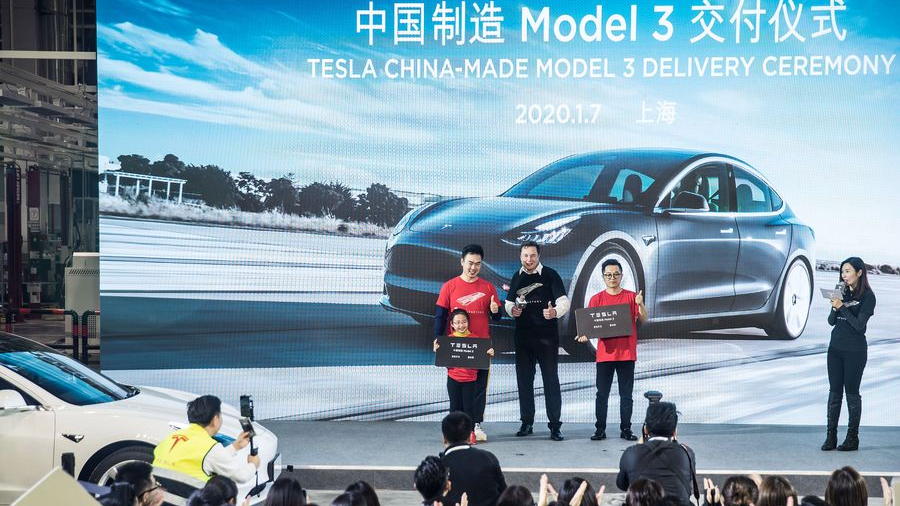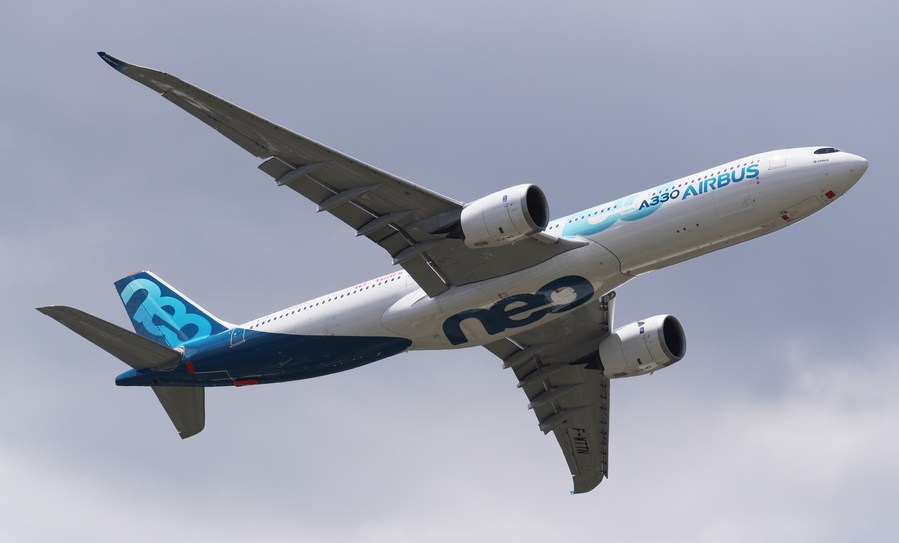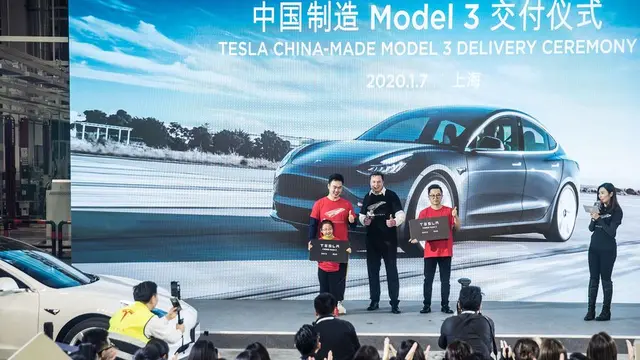
Tesla CEO Elon Musk poses with Tesla China-made Model 3 vehicle owners during a ceremony in Shanghai, east China, January 7, 2020. /Xinhua
**Editor's note: **Johannes Drooghaag is an analyst and strategist for cybersecurity in the Netherlands and author of "The Human Element in Cyber Security." The article reflects the author's opinions, and not necessarily the views of CGTN.
Did you know that Tesla gets several layers of tax benefits in the U.S.? The company receives several tax cuts directly to support its drive to develop environment-friendly electric vehicles, or for example, for its new factory to build the famous Cybertruck. Its customers get tax incentives for the same reason: promote environment-friendly electrical vehicles.
Those tax benefits are under regular review and besides federal tax benefits, there are also state and regional benefits. Future U.S. administrations, which will likely place a higher priority on environment and sustainability, are expected to introduce new tax benefits.
In some parts of the U.S., there are even tax cuts for electricity to charge Tesla cars and all that is a very good thing from the perspective of sustainability. The more people we can motivate to drive an electric car, the less we depend on fossil fuel, and the less carbon dioxide we produce. Thumbs up!
Now, let us have another look at the same model and do that from the perspective of a very popular battle cry from the current administration: "almost all countries are trading unfairly with the U.S." Not only the European Union and China got in the crosshairs of this administration, also longstanding partner Canada and of course Mexico must deal with these perpetual accusations of unfair trade.
Tesla, and let me stress that I love what they are doing, is getting tax cuts on both sides of their supply chain.
As a manufacturer of electrical cars, they get tax cuts which lower their operating costs that allow the company to either increase its net profit after taxes or lower its sales prices. As a seller of electrical cars, their customers get tax cuts on the purchasing price on top of the tax cuts Tesla already got, and depending on which state they live in, the customer might even get tax cuts just by owning the car — in some cases, even for charging electrical "fuel."
The result of these tax incentives is that the total costs of manufacturing and owning a car are lower than its actual costs. Great for the environment, but is it fair? Is it fair when, for example, non-U.S. electric car manufacturers do not get the same tax benefits? How can it be aligned with the claims of the current administration that basically every country is guilty of unfair trade with the U.S. when it itself hands out significant benefits to its own industry which exports products? And Tesla is just one example of many.

An Airbus A330 NEO performs during a flight display at the 53rd International Paris Air Show held at Le Bourget Airport near Paris, France, June 17, 2019. /Xinhua
The U.S. administration is fighting a battle with the European Union (EU) over Airbus and subsidization, where Airbus is a direct competitor of U.S.-based Boeing. Claiming "unfair trade" with the U.S. and using a 7.5 billion U.S. dollars tariffs package to balance that, it aims to make Airbus less attractive in the U.S. and abroad.
It does not take much effort to find out that Boeing itself received massive and significantly higher tax benefits in the U.S. over the same period. The tax benefits Boeing received exceed even the total volume of tariffs on the EU which the U.S. implemented.
Instead of seeking dialogue and finding solutions, the U.S. administration decided to do what it does best: conflict. The United States slaps tariffs on its trading partner and seeks to create an economical benefit for its domestic market on top of the tax incentives it already provided.
In a similar way, we are seeing the U.S. – China trade war develop.
"Easy to win," in the words of President Trump, it started with a bundle of tariffs on the "unfair trade" between China and the U.S. One Chinese company after the other find themselves in the crosshairs of the U.S. administration – Huawei as the "mother of all cyber security risks" and now TikTok for basically the same reasons, and many more.
China is the main supplier of consumer products for the U.S. market — we all know that. What most people do not know is that China also supplies parts and components for the U.S. manufacturing sector, machinery and even furniture. Some 11 percent of the U.S. aluminum demand is supplied by China, making it the second largest supplier after Canada. And as soon as we open tech devices, we will hardly be able to find one without some parts which are produced in China.
A trade deficit of more than 400 billion U.S. dollars in 2018 was in the eyes of the current U.S. administration the result of unfair trade and "state sponsored." In their view, it's not because U.S. companies have not been able to provide better products or better pricing, and especially not both; not because the majority of U.S. corporations have outsourced manufacturing and even design to Asia to benefit from lower costs in the past decades. No, it's solely due to unfair trade, according to Trump. Therefore, the U.S. imposed tariffs, sanctions, more tariffs, and a chain of protectionist measures to enforce economic benefits for American corporations.
However, the sword cuts both ways. The products and parts from China that the U.S. companies need are more expensive now. An estimated one million U.S. jobs will be lost as a result of these actions. Not just unfair, also unwise.
And Tesla? Oh, they are way smarter than this. They just build a gigafactory in China!
(If you want to contribute and have specific expertise, please contact us at [email protected].)
 简体中文
简体中文

